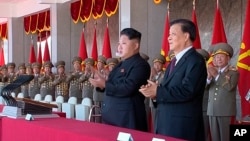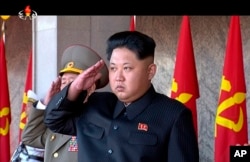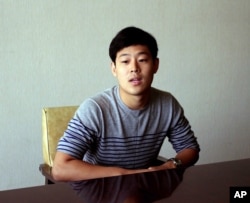North Korea’s massive military parade on Saturday was marked by bellicose rhetoric against the United States, but with a senior Chinese delegation in attendance, Kim Jong Un dialed back other potentially provocative acts and language.
On Monday South Korea’s Unification Ministry Spokesman Jeong Joon-hee said Pyongyang showed some restraint during the celebration of the 70th anniversary of the founding of North Korea’s ruling party.
"It seems like North Korea promoted internal solidarity and put an effort into removing its negative image,” Jeong said.
Ready for war
During the Pyongyang celebration Supreme Leader Kim Jong Un asserted that North Korea is prepared for “any type of war” against the U.S. and some 20,000 “goose-stepping” soldiers, tanks, inter-continental ballistic missiles, and fighter jets were featured during the three hour long parade.
But the North Korean leader made no direct mention of the country's nuclear program, nor did Pyongyang launch a long-range rocket or satellite test that earlier officials indicated was being planned for the event.
Analysts credit the presence of a high level Chinese delegation at the celebration headed by Liu Yunshan, the Chinese Communist Party's fifth-ranked leader with North Korea’s recent moderate behavior. During the parade Liu stood next to Kim and the two were shown smiling and conversing.
In a conciliatory letter to the North Korean leader, Chinese President Xi Jinping said "The long friendship between China and North Korea is a treasure made,” and that he hopes the “relationship will continue to grow.”
During his speech Kim Jong Un also emphasized the strong historic ties between the two allies.
Repairing frayed relations
Although North Korea is dependent on China for economic support, relations between the two allies have been strained after Pyongyang conducted its third nuclear test in 2013.
China supported United Nations sanctions in the wake of the 2013 nuclear test and the young North Korean leader who took power in 2011 has yet to visit China.
Beijing wants Pyongyang to re-enter international talks to end its nuclear program in exchange for easing of sanctions and increasing economic aid and development.
Washington and Seoul have maintained that Pyongyang must cease all provocations and shut down its nuclear program before new talks can happen.
Pyongyang’s new emphasis on friendship and cooperation with Beijing may indicate the Kim Jong Un regime wants to reduce regional tensions and focus on improving its economy.
US Student released
North Korea also recently released a South Korean student who had been detained for months after he illegally crossed into the North, and agreed to allow reunions for families separated by the division of the Korean peninsula.
Kim Yong-hyun, a North Korean studies professor at Dongguk University in Seoul said Beijing used the anniversary celebration to reinforce Pyongyang’s good behavior.
“It is clear that China wants to improve its relations with North Korea,” Professor Kim said.
When they meet this week in Washington, South Korean President Park Geun-hye and U.S. President Barack Obama will address the North Korea situation. Professor Kim said the two leaders should discuss how to reinforce North Korea’s recent conciliatory actions and the possibility of improving relations with Beijing.
“I hope President Obama will focus on talks with North Korea, rather than pressure on North Korea,” he said.
KN-08 capability
The parade also gave military intelligence officials the opportunity to examine the North Korean KN-08 inter-continental missile that has a maximum range of 12,000 kilometers and is capable of reaching the western coast of the U.S.
After reviewing footage of the weapons on display, Seoul’s Defense Ministry deputy Spokesman Na Seung-yong reaffirmed its assessment of Pyongyang’s limited capability to mount a nuclear warhead to its long-range missile.
"We suspect that North Korea may have reached a high level of miniaturization of nuclear weapons, but it still does not have capability to install them on a ballistic missile," said Na.
Nuclear weapons analysts say if North Korea’s nuclear weapons development program continues unabated, its nuclear arsenal could expand from 10 to 16 nuclear weapons, to between 20 and 100 in the next five years. And Pyongyang is likely to continue to make technological advances to miniaturize warheads to fit onto ballistic missiles.
Youmi Kim in Seoul contributed to this report.









